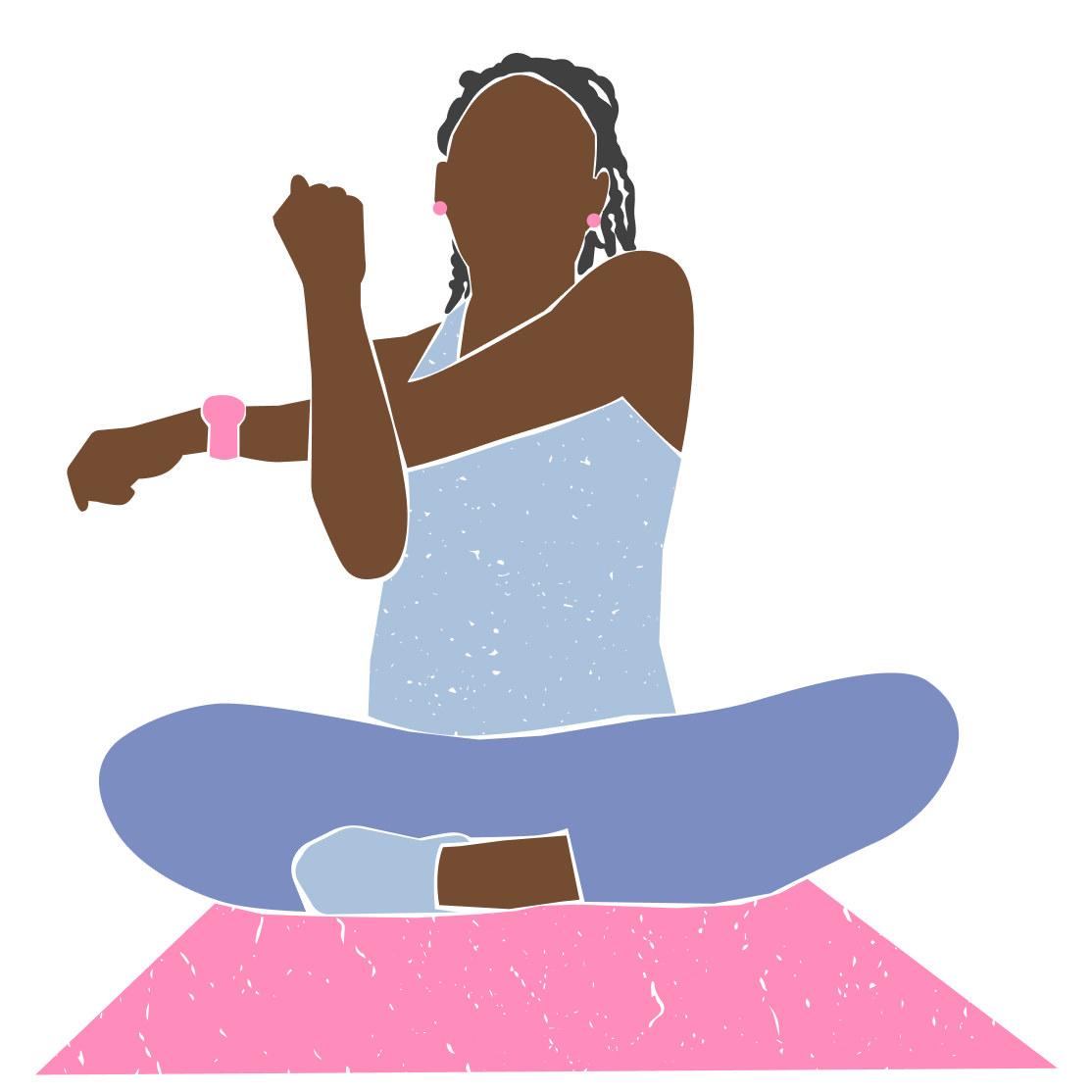If you're feeling extra tired during perimenopause or menopause, you're not alone—menopause fatigue is a common struggle. This isn't just "busy day" tired, but a deep exhaustion that can make you feel like you're running on empty. Hormonal changes, sleep issues, and everyday stress can all contribute to this low energy. But don’t worry—you don’t have to just power through menopause fatigue. With some simple lifestyle changes and possibly hormone replacement therapy (HRT), you can start to feel like yourself again and have more energy to take on your day.
We’re going to level with you: Menopause fatigue doesn’t mess around. Sure, you’ve felt low energy before in your life—but this kind of tired feels new. It’s not like “busy day tired” either, but the type of exhaustion that settles into your bones and makes you want to sneak off for an afternoon nap or pack it in right after dinner. What’s going on? The answer: Your newfound fatigue could be a sign you’re in perimenopause or full-blown menopause.
During perimenopause—the transition period when your ovaries begin to slow down on estrogen production before your periods officially stop—levels of estrogen can fluctuate quite dramatically. Those changes in estrogen levels are often responsible for the hot flashes, night sweats and frequent wake-ups, and other sleep problems that may be chipping away at your ability to get solid, restorative rest.
Unfortunately, many women see increased fatigue as a natural consequence of living a jam-packed life (work demands! kid demands! life demands!) and never-ending worries that keep them up at night (money, aging parents, a sick friend, the state of the world). No matter what you’re going through, feeling worn out isn’t something you have to put up with or accept as your new normal.
That’s why it’s important to know that there is help and treatment, including possible medication and targeted lifestyle changes. Read on to learn more about menopause fatigue: what causes it and how to feel more like yourself again—the more rested, refreshed version of you.
Understanding Menopause Fatigue
The menopausal transition brings with it a number of symptoms, from hot flashes and night sweats to low mood, memory blips, skin and hair changes, sexual health problems, and more. But an increase in fatigue often tops the list.
In fact, fatigue has been found to be one of the most common symptoms during this stage of life, affecting three out of four women according to a 2017 study in the Journal of Psychosomatic Obstetrics & Gynecology. Other research points to the fact that more than four times the women who are postmenopausal reported physical and mental exhaustion compared to premenopausal women.

How does menopause contribute to such intense fatigue? Oh, let us count the ways! There are a few potential reasons, including these:
- Hormonal changes that disrupt a range of your body’s systems, including temperature regulation. (This is why you’re throwing the covers off at 2 a.m.)
- Sleep problems in menopause, often caused by hormonal changes.
- Professional and personal demands (aka life just giving you a bit more than you’d normally want to handle). Many women can’t fall asleep at night because turning off their anxiety feels impossible.
Main Causes of Fatigue During Menopause
How Hormonal Changes Contribute to Menopause Fatigue
When hormone levels begin to decline during the menopause transition, your chances of getting high-quality shut-eye goes down with them. Let’s review a few key hormones and their connection to falling and staying asleep.
Estrogen
This hormone regulates both norepinephrine and serotonin, two body chemicals that influence the sleep-wake cycle and mood. As estrogen starts to decline during perimenopause, those chemicals fluctuate as well, increasing the risk of both anxiety and depressive symptoms and trouble sleeping.
Progesterone
You may already know that this hormone comes with calming, sleep-promoting benefits. It’s often referred to as the “relaxing hormone” because it has a mild sedative effect. So it makes sense that having less progesterone may make it more difficult to fall and stay asleep now.
Melatonin
The body’s production of melatonin—the hormone that is naturally produced by the body as light exposure decreases, getting us primed for nighttime sleep—also declines with age. Studies indicate that postmenopausal women with insomnia have lower melatonin levels.
Cortisol
Also known as the stress hormone, cortisol affects many bodily functions, including sleep. Cortisol production is typically high during the day (peaking in the morning when you wake), and low at night once you’re relaxed and headed for bed. However, women at midlife may have higher levels of cortisol near bedtime, which can keep us wide awake.

Sleep Disruptions and Fatigue During Menopause
“We found that more than 70% of Midi patients have sleep complaints,” says Midi’s Chief Clinical Officer, Mindy Goldman, MD, who’s been a practicing OB/GYN at the University of California, San Francisco (UCSF) for almost three decades. “A lot of people think of sleep issues and just their impact on quality of life, but poor sleep is actually associated with a higher risk of certain diseases.” That’s why it’s important to tackle sleep issues early—don’t just wait them out.
And it’s about more than just restless nights. Other factors—some directly related to menopause, some not—may be contributing to your fatigue, including:

- Night sweats: If you’ve ever woken up drenched in wet, cold pajamas, you know that night sweats are bonafide sleep ruiners, and hormone withdrawal during the menopause transition plays a huge role in triggering them. Hot flashes occur when the brain’s thermoregulatory center (the hypothalamus, which controls heat production and loss), starts faltering as a result of shifting estrogen levels. When estrogen rollercoasters and drops, the hypothalamus becomes more sensitive to slight changes in body temperature and can send you into hot-and-sweaty mode for no environmental reason.
- Increased nighttime bathroom breaks: Estrogen depletion can lead to this urologic issue. One report showed that 76% of women over the age of 40 wake up at least once per night for a bathroom run. Having to get up to pee means you may struggle to fall back asleep. “This is called sleep maintenance insomnia,” says Dr. Goldman. “It’s the one that's actually most common during menopause—difficulty going back to sleep after awakening in the middle of the night. And we know that insomnia causes significant distress and interferes with quality of life.” Often, using vaginal estrogen can help this issue (more on hormonal solutions later).
- Sleep apnea: Sleep apnea (aka obstructive sleep apnea) is a condition that causes people to momentarily stop breathing while sleeping, leading to intense daytime fatigue. And according to research, the prevalence of sleep apnea rises markedly after menopause, with 47% to 67% of post-menopausal women suffering from it.
- Restless leg syndrome: This condition is more common in midlife, and can be associated with the estrogen fluctuations and vitamin or mineral deficiencies, such as low iron levels.
Emotional and Psychological Factors That Affect Fatigue
Let’s face it: Midlife is often one of the busiest periods we go through, so we can’t ignore how all the plates you’re spinning may be draining your energy levels. Whether it’s work, your relationships, demands of children or aging parents, the number of perceived stressors in your life may be at an all time high. The competition for your time and attention can factor into why you feel so burned out right now, and rightfully so!
So if you’re sometimes a little zombie-like, cut yourself some slack. And the good news, says Dr. Goldman, is that there are things you can do to help lift the fog of fatigue to enjoy your days again.
Recognizing the Symptoms of Menopause Fatigue
Menopause fatigue isn’t just “I’m tired.” It’s often a deeper kind of exhaustion that can affect your body, your brain, and your emotional resilience—and it may feel out of proportion to what you did that day. You might notice it creeping in slowly over time, or hitting you all at once.
Here are some of the most common signs:
- Persistent tiredness, even after adequate rest. You sleep (or at least you think you slept), but you still wake up feeling drained—like your battery never fully charged.
- Difficulty focusing or “brain fog.” You may feel forgetful, scattered, or slower to process information. Reading an email twice, losing your train of thought mid-sentence, or struggling to find the right word can all be part of this.
- Feeling worn out by routine activities. Things you used to do on autopilot—making dinner, running errands, getting through a workday—can suddenly feel like major efforts. You might find yourself needing to lie down more often or cancel plans you’d normally keep.
- Increased irritability and low mood. When you’re running on empty, it’s harder to stay patient or upbeat. You may feel more emotionally sensitive, more easily overwhelmed, or more “done” than usual—even when nothing big has changed.
A key clue: this fatigue tends to feel different from normal tiredness. It may show up alongside other menopause symptoms (like night sweats, hot flashes, anxiety, or disrupted sleep), or it may be one of the first signs that your hormones are shifting.
Fatigue in Perimenopause
If you’re in perimenopause (the years leading up to your final period when estrogen is on the decline and your periods may be irregular) and experiencing crushing fatigue, you’re probably wondering: How long will this last? Research suggests that sleep problems, such as waking several times throughout the night, begin in perimenopause and persist through to menopause (which is defined as starting exactly one year after your final period). But hoping and waiting for decent rest to find you again is no way to live. “No matter what the symptom is, whether it's hot flashes, night sweats, or sleep disruption, don't just deal with it. There are plenty of effective solutions,” says Dr. Goldman.
The length of perimenopause is different for every woman; this stage lasts on average four years, though it can be as long as 10. In any case, it’s not a brief blip, so if sleep problems persist or get worse, consult a specialist or talk to a healthcare practitioner. Fatigue may be common during this time, but that doesn’t mean you’re destined to walk around totally drained.
And if fatigue is new to you, that’s another reason to reach out, as this may be one of the first signs that you’re in perimenopause. Getting help early can set you up for success—and fewer disruptive symptoms—over the long run.
When to Seek Medical Help
Fatigue is common during perimenopause and menopause—but that doesn’t mean you should ignore it or assume nothing can be done.
Menopause-related fatigue often fluctuates and may appear alongside symptoms like hot flashes, night sweats, sleep disruption, or mood changes. However, other conditions that are common in midlife can cause similar exhaustion, including thyroid disorders, anemia, depression, anxiety, and sleep apnea. Because these issues are treatable, it’s important not to self-diagnose.
You should consider talking with a clinician if your fatigue is persistent, worsening, or interfering with daily life, or if it’s accompanied by symptoms like low mood, brain fog, dizziness, shortness of breath, or unexplained weight or sleep changes.
Even if your fatigue turns out to be primarily hormonal, help is available. There are a number of solutions and treatments that can help you feel more like yourself again—let's take a look at those.
Strategies for Boosting Energy Levels and Fighting Fatigue
Treatments such as hormone therapy, sleep-focused care, and targeted lifestyle or medication options can significantly improve energy, focus, and overall quality of life.
Hormone Replacement Therapy for Menopause Fatigue
Ready for some news that’ll perk you up? Hormone replacement therapy (HRT) can be a powerful tool to support quality sleep and combat menopause fatigue.
First, some background: The name HRT is a little misleading—you’re not replacing any hormones but supplementing decreased estrogen, and in patients who still have a uterus, adding back progesterone or progestin, to minimize any risk of uterine cancer. HRT works by releasing bioidentical hormones (which means they have the same chemical and molecular structure as hormones that are produced in the human body) into the bloodstream. It is available in many forms. One note: Some experts prefer the term Menopause Hormone Therapy (MHT).
At Midi, we’ve heard from thousands of women that HRT helped them finally get good rest, and piles of research backs them up. HRT can be extremely effective in treating insomnia, reducing symptoms by 90%. That’s major, since difficulty sleeping affects 61% of menopausal women.
For those who experience hot flashes, nearly 44% suffer from chronic insomnia (night sweats are a major culprit there). Since HRT is the single most effective treatment for vasomotor symptoms (hot flashes and night sweats), it follows that it’s been shown to improve sleep quality.
Also remember that estrogen regulates body chemicals that influence the sleep-wake cycle and mood. So adding back some of the estrogen your body loses in the menopause transition can also help address insomnia, sleep apnea, and sleep-wrecking mood problems.
As part of HRT, most women are also prescribed progesterone or progestin (again, the exception are those who’ve had a hysterectomy). We’ve covered the calming effects of this hormone and those translate into improved sleep, which is why Midi clinicians recommend taking progesterone before bed, as part of a regular HRT routine. Progesterone also affects respiration, protecting against breathing issues such as sleep apnea.
HRT is not right for every woman, so it’s important to discuss your options with a Midi clinician or another menopause specialist who can give you individualized recommendations.
5 Proven Lifestyle Changes to Increase Your Energy Levels During Menopause
When you’re tired, you may not feel up to making any lifestyle changes at all. Totally understandable. Rather than overhauling every routine and launching a whole new way of life, start with one thing on this list. As you start to feel more rested, you can roll that newfound energy into tackling another habit (...and then another).
1. Try Supplements and Botanical Therapies
Certain supplements can help improve sleep disturbance symptoms:
- Cortisol support can be a powerful aid for women who suffer from poor sleep. Midi's Daily Cortisol Support features a combination of clinically studied adaptogens, amino acids, and botanicals (including ashwagandha, L-theanine, and chelated magnesium glycinate) to help manage cortisol for better focus, mood, sleep, and stress resilience.
- Melatonin can reduce the time it takes to fall asleep, and increases the duration and quality of sleep.
- Valerian, a flowering herb native to Asia and Europe, also has proven benefits for postmenopausal women.
- To help fall asleep a bit faster, Midi also suggests trying L-tryptophan, L-theanine, tart cherry juice, and glycine
- Other supplements that help relax the body, quiet the mind, and enhance sleep include lavender, passionflower, chamomile and magnesium.
Make sure to consult with a healthcare practitioner before starting on any of these supplements as they may have side effects or interfere with other medications. Some supplements may take up to 4 weeks to start working, so be patient.
2. Look at How You're Eating

We all know that when we’re exhausted, making the best food choices can be hard. But what you eat, when, and how much can impact how you feel throughout the day, as well as how you sleep at night. Women in menopause are more likely to develop GERD (gastroesophageal reflux disease), and the symptoms, like chronic acid reflux, can disturb your sleep. Try to avoid eating large or heavy meals too close to bedtime and watch your intake of spicy or acidic foods, all of which trigger reflux. In addition, take a look at your overall nutritional choices and see where you could make some improvements. Eating a balanced diet can give your body the energy it needs during the day and promote better sleep. Overall, the Mediterranean Diet—high in plant-based foods, healthy fats, and seafood—is the one that experts recommend for menopausal women, as it can address many issues at once, including fatigue, weight gain, cardiovascular health, and more.
3. Limit (or Eliminate) Caffeine, Alcohol, and Nicotine
When your eyelids feel at half-mast, it’s understandable to reach for caffeinated coffee or energy drinks to perk up. But over-relying on caffeine for a boost can backfire by making it difficult to fall asleep later that night, creating a cycle where you feel extra-needy of caffeine the next day. Dr. Goldman suggests having your last caffeinated beverage by or before 3 o’clock in the afternoon.
Now let’s talk about alcohol and nicotine. While a nightcap may make it easier to fall asleep initially, alcohol intake is also associated with sleep problems. And nicotine use (unhealthy in a whole host of ways) contributes to worsening menopause symptoms, which in turn mess with your sleep. If you are having difficulty cutting back on any of these substances, reach out to your clinician, who can guide you toward resources to help you reduce or quit these entirely.
4. Keep Moving
Exercise is one of the best things you can do for better shut eye, as it’s been shown to improve the quality of your sleep and reduce insomnia. But of course, the problem is, when you’re fatigued, the last thing you may want to do is hit the gym or lace up those sneakers for a jog. That’s okay—you can gravitate toward the type of movement that feels good for you. That might be an early morning walk with friends, or a mind-body practice, such as Pilates or yoga, to help improve your sleep and daytime energy levels. “Just try not to exercise too close to bedtime,” says Dr. Goldman. “It’s best to have a three hour buffer between your workout and when you turn in for the night.”
5. Practice Sleep Self-Care
Setting up a relaxing bedtime routine for yourself sends a strong message to your brain and body: You’re ready for sleep. Things you can do include taking a warm shower, doing some light stretching, trying deep breathing or mindfulness exercises, or reading a book (but maybe not a thriller). What it doesn’t include is doom-scrolling on your phone into the wee hours. Make sure that your room is cool, dark, and quiet. Sticking to a consistent sleep-wake schedule can also help prime you for bedtime.
Prescription Medications for Menopause Fatigue
There are certain prescription medications (sometimes used off-label) that can help with sleep, so you should talk with your doctor about potential options for you. As for traditional sleeping pills, while it may be tempting to try those, they may have side effects and can be habit-forming, which is why Midi clinicians only recommend them as a last resort.
The Takeaway
- Feeling fatigue during perimenopause and menopause is a common issue—with a range of causes, including hormonal changes, sleep problems, and increased demands and perceived stress in various areas in your life.
- You can combat menopause fatigue and boost your energy with effective everyday strategies, including improving your diet and sleep habits, increasing how much you move your body, and finding more ways to care for yourself.
- To help manage the hormonal changes that may be contributing to your fatigue, hormone replacement therapy (HRT) may be right for you, but you should discuss your individual needs with a clinician.
If you’re in perimenopause or menopause and want guidance from clinicians who specialize in women’s midlife health, book a virtual visit with Midi today.
Hormonal change is at the root of dozens of symptoms women experience in the years before and after their period stops.
Our trained menopause specialists can help you connect the dots to guide you towards safe, effective solutions.
Whether you need personalized guidance or a prescription routine to tackle symptoms—including brain fog, hot flashes, sleep trouble, mood swings, and weight gain—we’ve got you covered. Learn more here.
Midi’s mission is to revolutionize healthcare for women at midlife, wherever they live and whatever their health story. We believe that starts with education, to help all of us understand our always-changing bodies and health needs. Our core values guide everything we do, including standards that ensure the quality and trustworthiness of our content and editorial processes. We’re committed to providing information that is up-to-date, accurate, and relies on evidence-based research and peer-reviewed journals. For more details on our editorial process, see here.






